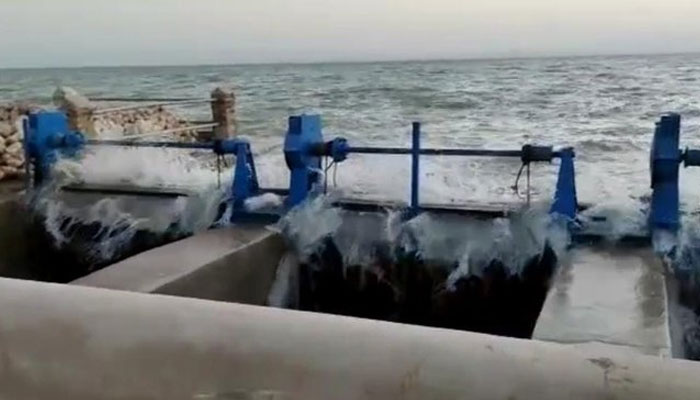Dyke breached as increased water pressure worsens situation at Manchar Lake
Deputy commissioner had earlier said that the dyke will not be breached and last-ditch effort will be made to keep embankment intact
SEHWAN:The city administration finally breached the dyke built to restrict water near Bagh-e-Yousuf as the situation worsened due to the rise in water to a dangerously high level at Manchar Lake.
The authorities had ordered the residents of nearby localities to move to safer areas due to the increased risk of the enbankment breaking down as the pressure water grew.
Irrigation department officials said that the water pressure will subside up to 30% and will flow into the Indus River through Kiran Pur and Indus Link.
Earlier, Deputy Commissioner Jamshoro Capt. (Ret.) Farid-Uddin-Mustafa had said that the dyke will not be breached and a last-ditch effort will be made (to keep the embankment intact).
The official said that the water level in the Manchhar lake is steadily rising, warning that the lake's embankment may collapse at any time. As a result, he advised that the union councils of Wahar, Bobak, Jaffarabad, and Chana be vacated.
"The next 24 to 48 hours are crucial for the Manchhar Lake," he cautioned.
According to a Geo News correspondent, the water has started overflowing from the lake's banks at some points, triggering panic among the local population of Sehwan.
Citizens in Bobak and surrounding areas of the lake demand the city administration breach the embankment at Yousuf Bagh so that hundreds of villages can be saved from inundation.
Manchar Lake is the largest natural freshwater lake in Pakistan and is one of the largest lakes in Asia. It is situated west of the Indus River, in the Jamshoro and Dadu Districts, 18 kilometres from Sehwan Sharif.
The Deputy Commissioner further directed the people to avoid visiting Manchar Lake unnecessarily as its dyke, RD54 to RD58, is withstanding huge pressure.
Flood death toll rises to 1,300: NDMA
The death toll from ravaging monsoon floods in Pakistan neared 1,300 as government agencies and private NGOs continue with their relief operations described as a “humanitarian disaster of epic proportions”.
The death toll since June 14 has reached 1,290 with 29 people dying in the last 24 hours, the National Disaster Management Authority (NDMA) said on Saturday.
Large parts of the country remain submerged – particularly the provinces of Balochistan, Khyber Pakhtunkhwa and Sindh in the south. At least 180 people have died in Sindh followed by Khyber Pakhtunkhwa (138) and Balochistan (125).
Food insecurity, economic losses: Long-term impact of deadly floods on Pakistan’s economy
At least, 1,468,019 houses have been partially or totally damaged, while 736,459 livestock has been killed due to the floods.
Aid has flowed in from a number of countries, with the first humanitarian assistance flight from France landing on Saturday morning in Islamabad. But Pakistan’s largest charity group has said there were still millions who had not been reached by aid and relief efforts.
Initial estimates of the damage have been put at $10 billion, but surveys are still being conducted along with international organisations.
-
Security forces gun down 30 terrorists in multiple IBOs in KP: ISPR
-
MQM-P calls for new province in Sindh
-
US report validates Pakistan military edge over India: PM
-
Banned TTP poses serious threat to Pakistan security: UNSC panel
-
CM Afridi clarifies remarks on by-poll after ECP requests army deployment
-
Dubai sees 3.2m Pakistani passengers in 2025 as airport sets new milestone
-
Security forces kill 23 Indian proxy terrorists in KP's Kurram
-
Pakistan to construct island to boost oil exploration: report












